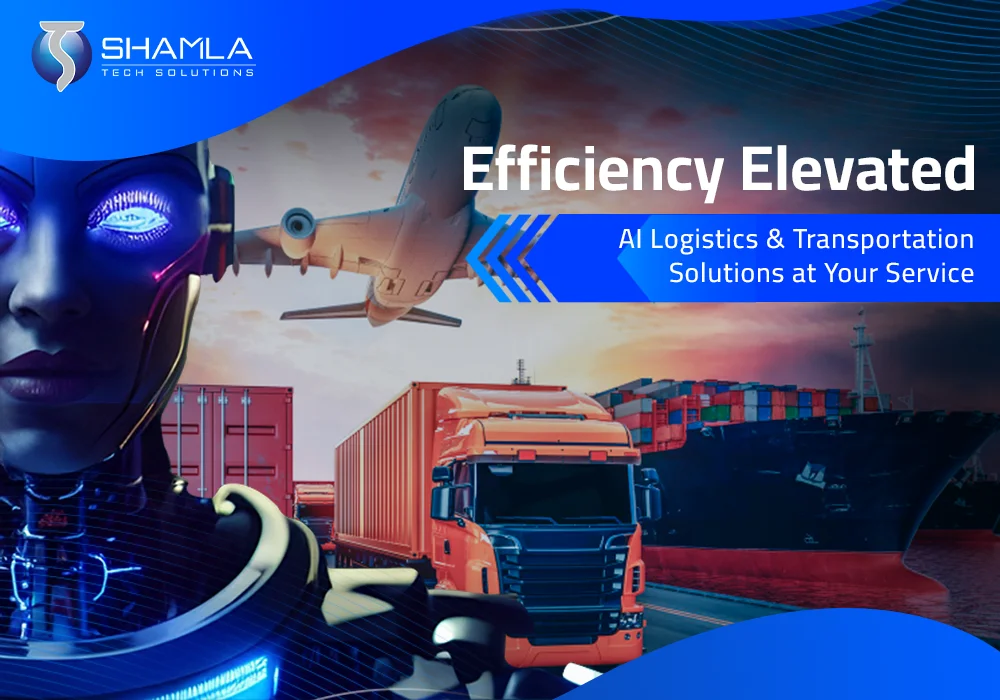How is AI Revolutizing the Logistics and Transportation Industry?
Artificial intelligence (AI) is revolutionizing the logistics and transportation industry, offering innovative solutions to enhance efficiency and streamline operations. AI in logistics and supply chain management involves the use of advanced technologies such as machine learning, big data, and the Internet of Things (IoT) to automate and optimize various processes. AI in logistics and transportation helps companies predict demand, manage inventory, and optimize routes, significantly reducing costs and improving delivery times.
The importance of AI in modern supply chain management cannot be overstated. AI logistics companies are leveraging these technologies to gain a competitive edge, ensuring quicker, more reliable services. Artificial intelligence in logistics enhances decision-making by providing real-time data and insights, enabling companies to respond swiftly to changing market conditions. AI in transportation and logistics also improves customer satisfaction through precise tracking and timely deliveries.
By integrating AI into their operations, logistics companies are not only improving their bottom line but also paving the way for a more efficient, sustainable future in supply chain management. The transformative potential of AI in transportation and logistics is vast, promising to reshape the industry and set new standards for operational excellence.

The Role of AI in Logistics and Transportation
AI in logistics and transportation is reshaping the industry by integrating advanced technologies to streamline operations and enhance efficiency. AI in logistics involves the application of machine learning, IoT, and big data analytics to automate and optimize various processes. These technologies enable logistics companies to predict demand, manage inventory, and plan optimal delivery routes, thus reducing operational costs and improving service quality.
Machine learning algorithms analyze vast amounts of data to identify patterns and make accurate predictions, which are crucial for demand forecasting and inventory management. IoT devices provide real-time tracking of goods and assets, ensuring transparency and enabling better decision-making. Big data analytics allows for the processing and analysis of large datasets, offering valuable insights into operational efficiencies and customer behaviors.
Artificial intelligence in logistics not only improves internal processes but also enhances customer satisfaction by ensuring timely and accurate deliveries. AI in transportation and logistics optimizes route planning, reduces fuel consumption, and minimizes delays, contributing to more sustainable operations. AI logistics companies are at the forefront of this technological revolution, leveraging these tools to gain a competitive edge and deliver superior service. The integration of AI in logistics and supply chain management is a game-changer, driving innovation and setting new industry standards.
Benefits of AI in Logistics
AI in logistics offers numerous benefits, transforming the way logistics and supply chain operations are managed. One of the primary advantages is improved efficiency and productivity. AI in logistics enables automation of repetitive tasks such as sorting, packing, and tracking, allowing human resources to focus on more strategic activities. This leads to faster processing times and reduces the likelihood of errors.
Cost reduction and optimization are other significant benefits of artificial intelligence in logistics. AI algorithms can analyze vast amounts of data to identify cost-saving opportunities in areas like fuel consumption, route planning, and inventory management. By predicting demand accurately, AI helps in optimizing inventory levels, reducing excess stock, and minimizing storage costs. AI logistics companies leverage these technologies to offer more competitive pricing and enhance their profitability.
Enhanced decision-making processes are another critical benefit of AI in transportation and logistics. Machine learning and big data analytics provide actionable insights that support strategic decisions. For instance, AI can predict potential disruptions in the supply chain and suggest proactive measures to mitigate risks. Real-time data analytics enable logistics companies to make informed decisions quickly, improving responsiveness and customer satisfaction.
Overall, the integration of AI in logistics and supply chain management drives operational excellence, cost efficiency, and superior service quality, positioning AI logistics companies at the forefront of the industry.

AI-Driven Transportation Management System
AI-driven transportation management systems (TMS) are revolutionizing the logistics industry by enhancing efficiency and effectiveness in logistics and supply chain operations. These systems leverage artificial intelligence in logistics to automate and optimize transportation processes, from route planning to fleet management.
One of the key features of AI-based TMS is advanced route optimization. AI in logistics and transportation utilizes real-time data and machine learning algorithms to determine the most efficient routes, considering factors such as traffic conditions, weather, and delivery windows. This not only reduces transit times but also minimizes fuel consumption, leading to significant cost savings.
Fleet management is another area where artificial intelligence in logistics excels. AI-driven TMS can monitor vehicle performance, predict maintenance needs, and optimize fleet usage. By analyzing data from IoT sensors and telematics, these systems ensure that vehicles operate at peak efficiency, reducing downtime and extending their lifespan.
Examples of AI applications in transportation include dynamic rerouting based on real-time traffic data and predictive maintenance schedules that prevent breakdowns. AI logistics companies are at the forefront of implementing these technologies, providing their clients with unparalleled service and reliability.
AI-driven transportation management systems are a game-changer in the logistics industry, offering sophisticated tools for route optimization and fleet management, and establishing AI logistics companies as leaders in efficiency and innovation.
Predictive Analytics for Demand Forecasting
Accurate demand forecasting is crucial in logistics and supply chain management. It ensures that inventory levels meet customer demand without overstocking or stockouts, leading to better resource allocation and cost savings. AI in logistics significantly enhances predictive analytics by processing vast amounts of data and identifying patterns that traditional methods might miss.
Artificial intelligence in logistics uses machine learning algorithms to analyze historical sales data, market trends, and external factors such as economic indicators and weather conditions. This enables AI in logistics and transportation to provide more accurate and timely demand forecasts. AI logistics companies leverage these advanced tools to anticipate customer needs, optimize inventory management, and improve overall supply chain efficiency.
Real-world examples of successful demand forecasting powered by AI include retailers accurately predicting seasonal demand spikes, allowing them to stock up on popular items without overburdening their warehouses. Another example is manufacturers using AI-driven forecasts to streamline production schedules, reducing lead times and ensuring timely delivery of products.
AI in logistics and supply chain management transforms predictive analytics, offering precise demand forecasting that drives efficiency and cost savings. Companies that embrace artificial intelligence in logistics gain a competitive edge by making data-driven decisions that meet customer demand effectively.
AI in Warehouse Management
AI is revolutionizing warehouse management by automating various operations and enhancing inventory management. AI in logistics and supply chain management enables the automation of repetitive tasks such as sorting, picking, and packing, significantly improving efficiency and productivity in warehouses.
AI-powered inventory management systems use machine learning algorithms to analyze real-time data on stock levels, order history, and demand patterns. This allows for precise inventory tracking and forecasting, ensuring optimal stock levels and reducing the risk of overstocking or stockouts. Artificial intelligence in logistics also facilitates automated reordering processes, ensuring that warehouses are always stocked with the necessary products.
The benefits of AI in warehouse management include reducing errors and improving accuracy in inventory handling. AI systems can quickly identify discrepancies between recorded and actual stock levels, minimizing the chances of human error. This leads to more accurate order fulfilment and higher customer satisfaction. AI in logistics and transportation also enhances safety in warehouses by automating dangerous tasks and monitoring working conditions.
So, AI logistics companies leverage artificial intelligence to transform warehouse management, automating operations and optimizing inventory management. This results in increased efficiency, reduced errors, and improved accuracy, making AI a crucial component in modern logistics and supply chain management.

Enhancing Customer Experience with AI
AI is revolutionizing the logistics industry by enhancing the customer experience through various means. In last-mile delivery, AI in logistics and supply chain management is improving efficiency and accuracy, ensuring timely deliveries and reducing delivery costs. Real-time tracking powered by AI enables customers to track their orders in real-time, providing transparency and peace of mind.
One of the key benefits of AI in logistics is personalized customer experiences. AI algorithms analyze customer data to understand preferences and behavior, allowing companies to offer personalized recommendations and tailored services. This leads to higher customer satisfaction and loyalty.
Several companies have successfully improved customer satisfaction through AI. For example, Amazon uses AI-powered algorithms to predict customer demand and optimize delivery routes, ensuring faster and more reliable deliveries. Similarly, FedEx leverages AI for real-time package tracking and delivery updates, enhancing transparency and customer communication.
AI in transportation and logistics is transforming the customer experience, offering personalized services and improving efficiency. Companies that embrace AI in logistics and transportation gain a competitive edge by delivering superior customer experiences.
Challenges and Considerations
Implementing AI in logistics and transportation comes with several potential challenges. These include the high initial costs of implementing AI systems, the complexity of integrating AI with existing systems, and the need for skilled personnel to manage and maintain AI solutions.
Ethical considerations and data privacy concerns are also significant factors to consider. AI systems rely on vast amounts of data, raising questions about how this data is collected, stored, and used. Ensuring compliance with data protection regulations and maintaining transparency with customers are essential considerations for companies adopting AI in logistics.
Organizational resistance to change can also be a challenge. Employees may be hesitant to adopt AI technologies due to fear of job displacement or concerns about the reliability of AI systems. Overcoming this resistance requires effective communication, training, and demonstrating the benefits of AI in improving efficiency and reducing costs.
While implementing AI in logistics and transportation offers significant benefits, companies must carefully consider and address these challenges to ensure successful integration and adoption.
Conclusion
In conclusion, the integration of AI in logistics and transportation is reshaping the industry, offering unparalleled opportunities for efficiency, accuracy, and customer satisfaction. AI-powered solutions streamline operations, optimize resource allocation, and enhance decision-making processes, leading to significant cost savings and improved productivity.
AI in logistics and supply chain management enables companies to adapt to changing market demands, anticipate customer needs, and stay ahead of the competition. From last-mile delivery to inventory management and route optimization, artificial intelligence in logistics is driving innovation and transforming the way goods are transported and delivered.
However, the adoption of AI in logistics also comes with challenges, such as high initial costs, data privacy concerns, and organizational resistance to change. Overcoming these challenges requires careful planning, investment in the right technologies, and a commitment to addressing ethical considerations.
As AI technology continues to advance, its applications in logistics and transportation will only grow, offering new opportunities for optimization and innovation. Companies that embrace AI in logistics and transportation will be well-positioned to thrive in the digital age, delivering superior services and experiences to their customers.


